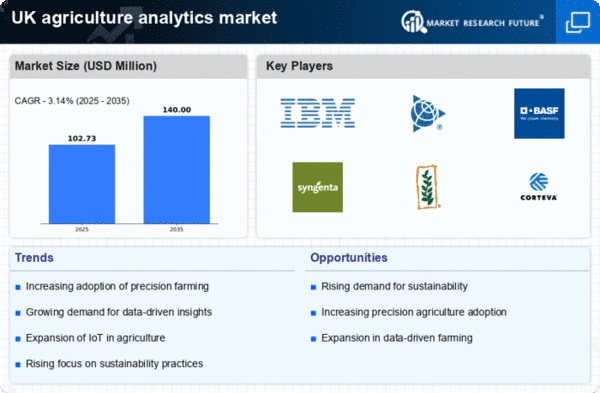Rising Demand for Food Security
The rising demand for food security significantly influences the agriculture analytics market. As the UK population continues to grow, the pressure on agricultural systems to produce sufficient food increases. The agriculture analytics market provides essential tools for farmers to maximize yields and minimize waste. By utilizing data analytics, farmers can make informed decisions regarding crop selection, pest management, and resource allocation. Reports indicate that the UK food production must increase by 30% by 2030 to meet future demands. This urgency drives the adoption of analytics solutions that enhance efficiency and sustainability in farming practices. Consequently, The agriculture analytics market is likely to expand. Stakeholders are seeking innovative ways to address food security challenges while maintaining environmental integrity.
Government Initiatives and Support
Government initiatives play a crucial role in shaping the agriculture analytics market. In the UK, various policies and funding programs are designed to promote the adoption of innovative agricultural technologies. The UK government has allocated approximately £160 million to support research and development in agricultural technology, which includes analytics solutions. Such financial backing encourages farmers to invest in data analytics tools that enhance productivity and sustainability. Furthermore, regulatory frameworks are increasingly emphasizing the importance of data-driven decision-making in agriculture. This supportive environment fosters growth in the agriculture analytics market, as stakeholders recognize the potential benefits of leveraging data for improved crop management and resource allocation. The alignment of government objectives with industry needs suggests a promising future for analytics in agriculture.
Technological Advancements in Agriculture
The agriculture analytics market is experiencing a surge due to rapid technological advancements. Innovations such as machine learning, artificial intelligence, and remote sensing are transforming traditional farming practices. These technologies enable farmers to collect and analyze vast amounts of data, leading to improved decision-making and resource management. In the UK, the adoption of precision agriculture tools has increased, with a reported growth rate of 15% annually. This trend indicates a strong inclination towards data-driven farming, which enhances productivity and sustainability. As farmers increasingly rely on analytics to optimize yields and reduce costs, The agriculture analytics market is expected to expand significantly due to various factors. The integration of advanced technologies not only boosts efficiency but also aligns with the growing demand for sustainable agricultural practices, making it a pivotal driver in the industry.
Increased Investment in Agri-Tech Startups
Investment in agri-tech startups is a notable driver of the agriculture analytics market. The UK has seen a rise in venture capital funding directed towards innovative agricultural technologies, including analytics platforms. In 2025, investments in agri-tech reached approximately £1 billion, reflecting a growing interest in solutions that enhance agricultural productivity. These startups often focus on developing cutting-edge analytics tools that provide farmers with actionable insights. The influx of capital not only accelerates innovation but also fosters collaboration between technology providers and agricultural stakeholders. As these startups continue to emerge, they contribute to the overall growth of the agriculture analytics market, offering diverse solutions that cater to the evolving needs of the industry. This trend indicates a vibrant ecosystem that supports the integration of technology in agriculture.
Consumer Awareness and Demand for Transparency
Consumer awareness regarding food sourcing and production practices is driving the agriculture analytics market. In the UK, there is a growing demand for transparency in the food supply chain, prompting farmers to adopt analytics solutions that provide traceability and accountability. Consumers increasingly prefer products that are sustainably sourced and produced with minimal environmental impact. This shift in consumer behavior encourages farmers to utilize data analytics to demonstrate compliance with sustainability standards and improve their market positioning. The agriculture analytics market is likely to benefit from this trend, as farmers seek tools that enable them to track and report on their practices effectively. By leveraging analytics, producers can enhance their credibility and meet the expectations of a more informed consumer base.
















